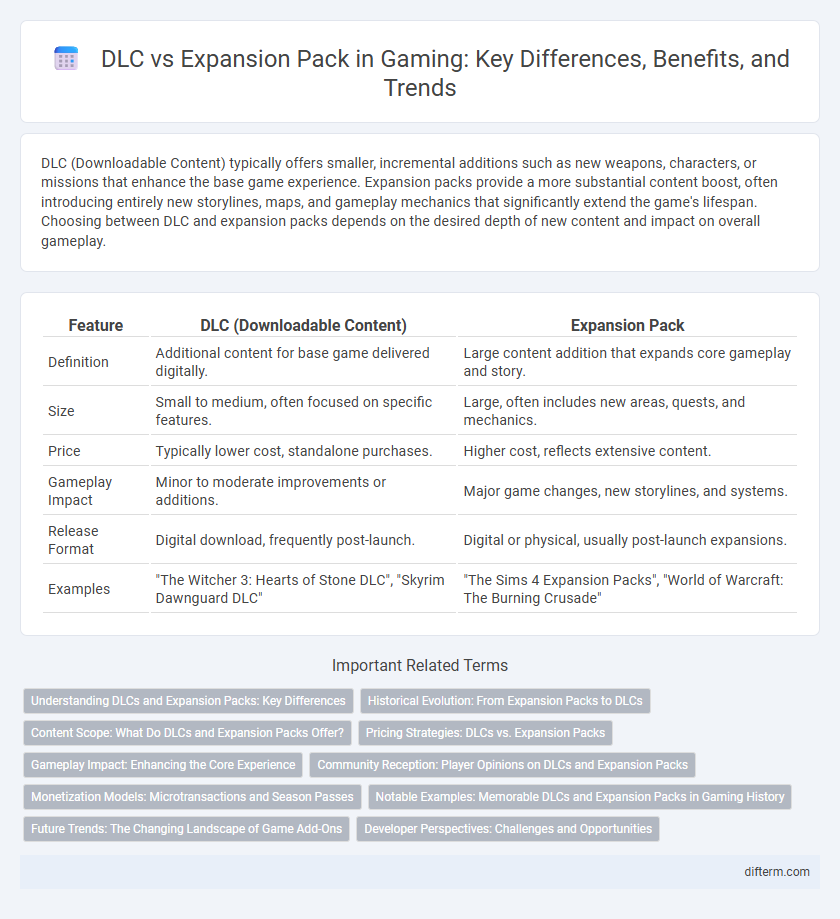DLC (Downloadable Content) typically offers smaller, incremental additions such as new weapons, characters, or missions that enhance the base game experience. Expansion packs provide a more substantial content boost, often introducing entirely new storylines, maps, and gameplay mechanics that significantly extend the game's lifespan. Choosing between DLC and expansion packs depends on the desired depth of new content and impact on overall gameplay.
Table of Comparison
| Feature | DLC (Downloadable Content) | Expansion Pack |
|---|---|---|
| Definition | Additional content for base game delivered digitally. | Large content addition that expands core gameplay and story. |
| Size | Small to medium, often focused on specific features. | Large, often includes new areas, quests, and mechanics. |
| Price | Typically lower cost, standalone purchases. | Higher cost, reflects extensive content. |
| Gameplay Impact | Minor to moderate improvements or additions. | Major game changes, new storylines, and systems. |
| Release Format | Digital download, frequently post-launch. | Digital or physical, usually post-launch expansions. |
| Examples | "The Witcher 3: Hearts of Stone DLC", "Skyrim Dawnguard DLC" | "The Sims 4 Expansion Packs", "World of Warcraft: The Burning Crusade" |
Understanding DLCs and Expansion Packs: Key Differences
DLCs (Downloadable Content) enhance existing games by adding new features, missions, or items without altering the core gameplay, typically smaller in size and scope. Expansion packs offer more substantial content, often introducing new storylines, characters, and significant gameplay changes, effectively extending the original game experience. Understanding the scope and impact of each helps gamers choose between quick content updates from DLCs or a deeper, more immersive experience through expansion packs.
Historical Evolution: From Expansion Packs to DLCs
Expansion packs emerged in the 1990s as substantial game add-ons offering new storylines, maps, and features, often requiring the original game installation. The early 2000s saw the rise of downloadable content (DLC), enabled by widespread internet access, allowing developers to deliver smaller, modular content updates more frequently. This shift from physical expansion packs to digital DLC transformed game monetization strategies and player engagement by providing continuous content delivery and extended gameplay experiences.
Content Scope: What Do DLCs and Expansion Packs Offer?
DLCs (Downloadable Content) typically provide smaller, focused additions such as new characters, weapons, or missions, enhancing the base game's experience without overhauling core mechanics. Expansion packs offer more substantial content, including new storylines, areas to explore, gameplay systems, and often significant changes to the original game world. Gamers choosing between them should consider DLCs for targeted enhancements and expansion packs for comprehensive, immersive content expansions.
Pricing Strategies: DLCs vs. Expansion Packs
DLCs (Downloadable Content) often use tiered pricing strategies, offering smaller, incremental content updates at lower price points to encourage frequent purchases. Expansion packs typically come with a higher upfront cost but provide substantial new content, such as storylines, maps, or characters, appealing to players seeking an extensive experience. Developers balance DLC pricing to maximize revenue through microtransactions, while expansion packs aim for value-driven purchases targeting dedicated fans.
Gameplay Impact: Enhancing the Core Experience
DLCs often deliver targeted gameplay enhancements, introducing new missions, characters, or items that deepen player engagement without altering the core mechanics. Expansion packs typically offer broader changes, adding substantial content like new worlds, storylines, and gameplay systems that significantly reshape the player's experience. Both formats aim to enrich the game world, but expansions provide a more immersive evolution of the base game's mechanics and narrative depth.
Community Reception: Player Opinions on DLCs and Expansion Packs
Community reception often splits on DLCs versus expansion packs, with players praising expansion packs for delivering substantial content that extends gameplay, while DLCs are sometimes criticized for fragmenting the experience with smaller add-ons. Expansion packs tend to foster positive player engagement by providing rich narratives and robust features, enhancing the core game significantly. Conversely, some gamers view DLCs as monetization strategies that offer limited value, leading to debates about fair content pricing and quality.
Monetization Models: Microtransactions and Season Passes
DLC often employs microtransactions as a monetization model, allowing players to purchase smaller content pieces or cosmetic items individually. Expansion packs typically use season passes, providing access to multiple future releases at a discounted rate, encouraging longer-term engagement. Both models aim to maximize revenue by targeting different player spending behaviors within the gaming market.
Notable Examples: Memorable DLCs and Expansion Packs in Gaming History
Notable examples of downloadable content (DLC) include "The Witcher 3: Hearts of Stone," which added significant narrative depth, and "Destiny 2: Forsaken," renowned for its extensive new gameplay and story elements. In contrast, expansion packs like "The Sims 2: Nightlife" and "World of Warcraft: The Burning Crusade" introduced substantial additions that fundamentally expanded the base game worlds and mechanics. Both DLCs and expansion packs have shaped gaming history by enriching player experiences through diverse content offerings.
Future Trends: The Changing Landscape of Game Add-Ons
DLCs are increasingly focused on delivering targeted content updates that enhance gameplay without overhauling the base game, while expansion packs tend to offer more substantial storylines and new mechanics, shaping distinct player experiences. Future trends indicate a rise in hybrid models combining episodic DLC content with expansion-like depth, fueled by evolving player expectations and advancements in digital distribution platforms. The integration of live-service elements and personalized content suggests a dynamic shift in how developers monetize and extend the lifecycle of games.
Developer Perspectives: Challenges and Opportunities
Developers face distinct challenges and opportunities when creating DLC versus expansion packs, with DLCs often requiring faster development cycles and seamless integration to maintain player engagement. Expansion packs demand more extensive content creation and narrative expansion, offering a chance to deepen the game world and increase long-term revenue. Both formats enable studios to extend a game's lifecycle but require strategic planning to balance innovation with consistency in gameplay experience.
DLC vs expansion pack Infographic

 difterm.com
difterm.com